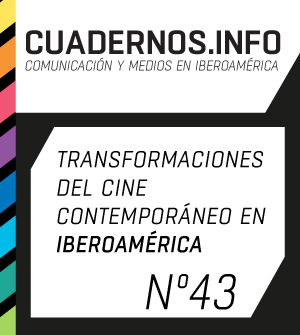El relato tiembla. Narrativas fracturadas contemporáneas en el cine de Alejandro Amenábar y Pedro Almodóvar
DOI:
https://doi.org/10.7764/cdi.43.1466Palabras clave:
análisis textual, cine postclásico, puzzle films, mind-game films, no linealidad narrativa, narrativas complejas, cine españolResumen
Este artículo analiza diversas obras del cine español contemporáneo como integrantes de una tendencia experimental de la complejidad audiovisual contemporánea: las llamadas puzzle films o mind-game films. Para resolver qué discurso subyace a su desestructuración en el caso español, analizamos fragmentos clave de Abre los ojos (1996), Los otros (2001), La mala educación (2004) y La piel que habito (2010). Concluimos que los principales malestares que emergen son el terror a no distinguir entre realidad y ficción, la desconfianza hacia la tecnología que condiciona la subjetividad y el olvido de la propia culpa.
Descargas
Citas
Aristóteles (2004). Poética [Poetics]. Madrid: Alianza.
Balló, J. (2009). Els Riscos del saber [The Risks of Knowledge]. Barcelona: Círculo de Lectores.
Balló, J. & Pérez, X. (1997). La Semilla inmortal: los argumentos universales en el cine [The Inmortal Seed: the Universal Plots in Film]. Barcelona: Anagrama.
Bovaira, F. & Cuerda, J. L. (Producers), & Amenábar, A. (Director). (1997). Abre los ojos [Open Your Eyes] [Motion picture]. Spain: Las producciónes del Escorpión S.L. / Sogetel / Les Films Alain Sarde / Lucky Red.
Bovaira, F., Cuerda, J. L., & Park, S. (Producers), & Amenábar, A. (Director). (2001). Los otros [The Others] [Motion picture]. Spain: Cruise-Wagner Productions / Sogecine / Canal+ España / Sogepaq / Dimension Films / Las Producciones del Escorpión / Miramax.
Bordwell, D. (2002). Film Futures. SubStance, 31(1), 88–104. https://doi.org/10.1353/sub.2002.0004
Bourriaud, N. & Hernández Navarro, M. Á. (2008). Heterocronías: tiempo, arte y arqueologías del presente [Heterochronias: time, art and archaeologies of the present]. Murcia: Cendeac.
Branigan, E. (1992). Narrative comprehension and film. London: Routledge.
Branigan, E. (2002). Nearly True: Plots, Forking Forking Interpretations: A Response to David Bordwell’s “Film Futures”. SubStance, 31(97), 105–114. https://doi.org/10.2307/3685811
Buckland, W. (2009). Puzzle films: complex storytelling in contemporary cinema. Chichester: Wiley-Blackwell.
Buckland, W. (2014). Hollywood Puzzle Films. New York: Routledge.
Burucúa, J. E. (2011). Las tragedias y los desgarramientos de la historia [The tragedies and tearings of the history]. Carta. Revista de Pensamiento y Debate del Museo Nacional Centro de Arte Reina Sofía, 2, 40–43. Retrieved from http://www.museoreinasofia.es/sites/default/files/revista/pdf/carta2.pdf
Cameron, A. (2008). Modular narratives in contemporary cinema. New York: Palgrave Macmillan.
Català Domènech, J. M. (2013). El Cine de pensamiento: formas de la imaginación tecno-estética [The cinema of thought: Shapes of the techno-aesthetic imagination]. Valencia: Universidad de Valencia.
Català Domènech, J. M. (2016). La gran espiral: capitalismo y paranoia [The great spiral: capitalism and paranoia]. Buenos Aires: Sans Soleil.
Cuevas, E. (2005). Christopher Nolan visto desde Gerard Genette: análisis narratológico de Memento [Christopher Nolan seen from the perspective of Gerard Genette: narratological analysis of Memento]. Zer, 10(18), 183–198. Retrieved from http://www.ehu.eus/ojs/index.php/Zer/article/view/3932
Didi-Huberman, G. (2009). La Imagen superviviente: historia del arte y tiempo de los fantasmas según Aby Warburg [The Surviving Image: Phantoms of Time and Time of Phantoms: Aby Warburg’s History of Art]. Madrid: Abada.
Doane, M. A. (2012). La emergencia del tiempo cinemático: la modernidad, la contingencia y el archivo [The Emergence of cinematic time: modernity, contingency, the archive]. Murcia: Cendeac.
Dzialo, C. (2009). “Frustrated Time” Narration: The Screenplays of Charlie Kaufman. In W. Buckland (Ed.), Puzzle Films. Complex Storytelling in Contemporary Cinema (pp. 107–128). Chichester: Wiley-Blackwell.
Elsaesser, T. (2009). The Mind-Game Film. In W. Buckland (Ed.), Puzzle Films. Complex Storytelling in Contemporary Cinema (pp. 13–41). Chichester: Wiley-Blackwell.
Elsaesser, T. (2013). Los actos tienen consecuencias. Lógicas del mind-game film en la trilogía de Los Ángeles de David Lynch [Actions Do Have Consequences. Logics of the Mind-Game Film in David Lynch’s Los Angeles-Trilogy]. L’Atalante. Revista de Estudios Cinematográficos, (15), 7–18. Retrieved from http://www.revistaatalante.com/index.php?journal=atalante&page=article&op=view&path%5B%5D=35#















